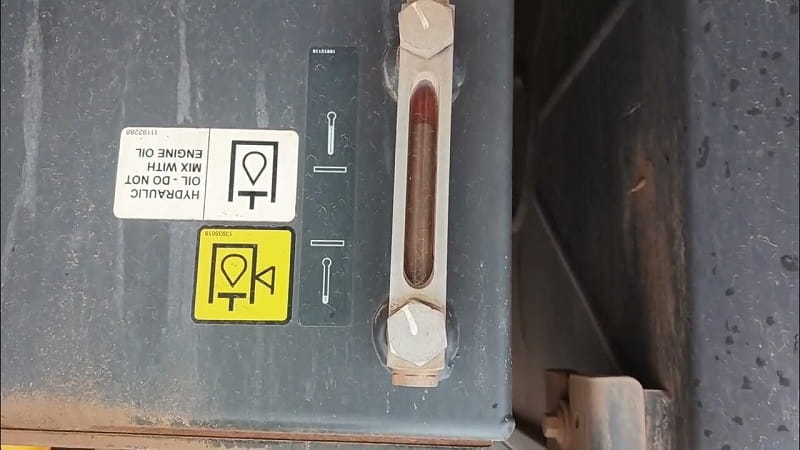Understanding Dump Truck Hydraulic Oil Capacity: Importance, Factors, and Maintenance catdumptruck.com | Hydraulic oil plays a critical role in the operation of a dump truck’s hydraulic system.
The oil is responsible for transmitting power, lubricating components, dissipating heat, and protecting the system from wear and contamination.
One of the most crucial aspects of hydraulic system maintenance is ensuring that the hydraulic oil capacity is correctly managed.
Having the correct amount of hydraulic oil ensures that the system operates efficiently and prevents potential mechanical failures.
This article explores the hydraulic oil capacity of dump trucks, factors that influence capacity, how to determine the correct amount of hydraulic oil, and best maintenance practices.
Understanding Hydraulic Oil Capacity
Hydraulic oil capacity refers to the volume of hydraulic fluid required for a dump truck’s hydraulic system to function properly.
The capacity can vary significantly depending on several factors, including the size of the truck, the type of hydraulic system, and the specific design of the hydraulic reservoir.
The hydraulic oil capacity of dump trucks generally ranges between 10 to 50 gallons (38 to 190 liters). However, larger heavy-duty dump trucks may require even more.
It is essential to check the manufacturer’s specifications to determine the precise capacity required for a particular truck model.
Factors Affecting
Several factors influence the hydraulic oil capacity in a dump truck:
1. Truck Size and Type
Smaller dump trucks require less hydraulic oil compared to large, heavy-duty models.
Off-road dump trucks and articulated haulers typically have larger hydraulic systems with higher fluid capacity.
2. Hydraulic Cylinder Size
The number and size of hydraulic cylinders directly impact oil capacity.
Telescopic cylinders may require more oil compared to single-stage cylinders.
3. Hydraulic Tank (Reservoir) Size
The hydraulic reservoir holds the oil before it is pumped through the system.
Larger reservoirs allow for better heat dissipation and system efficiency.
4. System Configuration
Some dump trucks use closed-loop hydraulic systems, which typically require less oil than open-loop systems.
Trucks with additional hydraulic functions (e.g., lift axles, stabilizers) may have higher oil capacity requirements.
5. Operating Conditions
High-temperature environments may require more oil to compensate for fluid expansion and potential overheating.
Frequent heavy loads and continuous operation demand a larger hydraulic oil capacity to maintain performance.
How to Determine the Correct Hydraulic Oil Capacity

Properly maintaining hydraulic oil levels ensures the system operates smoothly. Here’s how to determine the correct hydraulic oil capacity for a dump truck:
1. Check the Manufacturer’s Manual
The most accurate way to find the recommended oil capacity is by referring to the dump truck’s operating manual.
The manual provides details on the fluid type and capacity requirements.
2. Inspect the Hydraulic Reservoir
The hydraulic tank often has a sight gauge or dipstick indicating the minimum and maximum oil levels.
Ensure the fluid level remains within the recommended range.
3. Monitor System Performance
If the dump bed operates slowly or inconsistently, it may indicate insufficient hydraulic oil.
Unusual noises (e.g., cavitation, air bubbles) suggest the system might be low on fluid.
4. Measure Oil Drainage and Refill Quantities
During a complete hydraulic oil change, measure the amount of old fluid drained.
Compare this with the manufacturer’s recommended capacity when refilling.
Common Issues Related to Hydraulic Oil Capacity
Maintaining the correct hydraulic oil level is critical to avoiding mechanical failures. Here are some common problems and their potential solutions:
1. Low Hydraulic Oil Levels
Causes: Leaks, improper maintenance, fluid evaporation in high-temperature conditions.
Symptoms: Slow or weak lifting, excessive noise, overheating.
Solution: Regularly check for leaks and top off hydraulic oil as needed.
2. Overfilling the Hydraulic Tank
Causes: Adding too much oil beyond the recommended capacity.
Symptoms: Excessive pressure in the system, potential seal damage, foaming fluid.
Solution: Drain excess fluid and ensure the oil level is within the correct range.
3. Hydraulic Oil Contamination
Causes: Dirt, moisture, metal particles entering the system.
Symptoms: Discolored or milky fluid, decreased performance, component wear.
Solution: Use proper filtration, replace contaminated oil, and keep the system sealed.
Understanding Dump Truck Hydraulic Oil Capacity: Importance, Factors, and Maintenance
Best Practices for Hydraulic Oil Maintenance
Proper hydraulic oil maintenance extends the lifespan of the dump truck’s hydraulic system. Follow these best practices:
1. Regular Fluid Level Checks
Monitor hydraulic oil levels before operating the truck.
Ensure levels are within the recommended range.
2. Use the Correct Hydraulic Oil Type
Follow the manufacturer’s recommendations for oil viscosity and formulation.
Use high-quality hydraulic fluids with anti-wear and anti-foaming additives.
3. Routine Oil Changes
Replace hydraulic oil at recommended intervals to prevent contamination and degradation.
Drain and flush the system during scheduled maintenance to remove debris.
4. Inspect for Leaks
Regularly inspect hoses, seals, and fittings for leaks or damage.
Address leaks immediately to prevent oil loss and system failure.
5. Keep the Hydraulic System Clean
Ensure the reservoir is sealed to prevent dirt and moisture from entering.
Use clean tools and containers when handling hydraulic fluid.
6. Monitor Temperature and System Performance
Overheating can degrade hydraulic oil, reducing its effectiveness.
Ensure cooling mechanisms, such as hydraulic oil coolers, are functioning properly.
Understanding Dump Truck Hydraulic Oil Capacity: Importance, Factors, and Maintenance
Conclusion
Maintaining the correct hydraulic oil capacity is essential for the efficient operation of a dump truck’s hydraulic system.
Understanding the factors affecting oil capacity, regularly checking fluid levels, and following proper maintenance practices can prevent costly breakdowns and extend the lifespan of the hydraulic system.
By ensuring the right amount of hydraulic oil is used, operators can enhance system performance, reduce downtime, and improve overall safety. Proper oil management is a key aspect of maintaining a reliable and effective dump truck hydraulic system.
- 2004 Mack Dump Truck - April 21, 2025
- 2007 Mack Dump Truck: A Reliable Workhorse - April 20, 2025
- 2025 Mack Dump Truck: Innovation Meets Power - April 19, 2025





